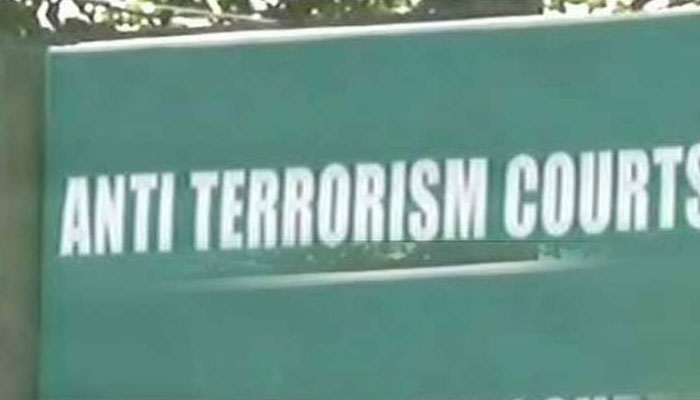Police failure to provide security to witnesses irks ATC
An anti-terrorism court (ATC) on Friday called comments from the Sindh home secretary and inspector general of police over the status of the witness protection programme in the province, after the police failed to provide security to two private witnesses against suspected Daesh militants who abetted the suicide attack at the shrine of Sufi saint Lal Shahbaz Qalandar in February 2017.
The ATC judge directed the respondents to depute a focal person who should file a report on the implementation of the Witness Protection Security and Benefit Act, 2017, along with recommendations for making the law more effective for “the benefit, security and safety of the witnesses”.
The two witnesses, who don’t live in Karachi, had a month ago sought security from the court after they were issued notices to appear in the trial to depose against the accused, Nadir Ali and Furqan, who allegedly facilitated the suicide bomber who attacked Lal Shahbaz Qalandar’s shrine in Sehwan.
At least 82 people, including women and children, were killed and 383 wounded as the bomber struck the shrine during the sunset when the devotees perform Dhamaal. The responsibility of the attack was claimed by Daesh, according to the Independent.
The judge expressed his displeasure at the police performance and dismissed the report submitted by the Counter-Terrorism Department (CTD) DIG to show compliance with the court’s previous orders of providing security to the witnesses.
The judge remarked that the report was only a correspondence from the DIG to the Shikarpur SHO. The judge observed that during the trial for the murder of Advocate Naimat Ali Randhawa, the eyewitnesses had gone into hiding “due to the fear of the demon of terrorism.” He added that the public had become too frightened to assist the legal system in dealing with terrorism cases, which was bringing a bad name to the country.
“Protection and security of the witnesses…does not seem to be at highest priority; witnesses are not being provided protection and security, not to talk of promotion and projection of the witnesses despite enactment of [the law].”
The judge specifically pointed out the section 4 of the Act that was about the witness protection programme which provided for the new identity, accommodation, reasonable financial assistance and compensation to the witnesses in case any harm was done to them.
The judge also directed the home secretary to explain if and under what mechanism any compensation was paid to the victims of the blast. The next hearing of the case will take place on January 20 inside the judicial complex at the Karachi Central Jail.
The ATC had indicted Ali and Furqan as alleged facilitators of the attack in September, 2019. Both the accused were arrested by the CTD. They allegedly worked for the banned Daesh.
According to the investigators, the accused and their absconding accomplices facilitated the attack. They were directed to do so by Mufti Hidayatullah, a chief of Daesh in Pakistan who was reportedly killed by security forces in Kalat in July, 2018.
The charge sheet said Ali did a recce of the shrine for three days and passed on the information to Hidayatullah who then prepared a suicide bomber, identified as Barar Brohi, and sent him along with Ali to Sehwan.
-
 China Confirms Visa-free Travel For UK, Canada Nationals
China Confirms Visa-free Travel For UK, Canada Nationals -
 Inside Sarah Ferguson, Andrew Windsor's Emotional Collapse After Epstein Fallout
Inside Sarah Ferguson, Andrew Windsor's Emotional Collapse After Epstein Fallout -
 Bad Bunny's Star Power Explodes Tourism Searches For His Hometown
Bad Bunny's Star Power Explodes Tourism Searches For His Hometown -
 Jennifer Aniston Gives Peek Into Love Life With Cryptic Snap Of Jim Curtis
Jennifer Aniston Gives Peek Into Love Life With Cryptic Snap Of Jim Curtis -
 Prince Harry Turns Diana Into Content: ‘It Would Have Appalled Her To Be Repackaged For Profit’
Prince Harry Turns Diana Into Content: ‘It Would Have Appalled Her To Be Repackaged For Profit’ -
 Prince William's Love For His Three Children Revealed During Family Crisis
Prince William's Love For His Three Children Revealed During Family Crisis -
 Murder Suspect Kills Himself After Woman Found Dead In Missouri
Murder Suspect Kills Himself After Woman Found Dead In Missouri -
 Sarah Ferguson's Plea To Jeffrey Epstein Exposed In New Files
Sarah Ferguson's Plea To Jeffrey Epstein Exposed In New Files -
 Prince William Prepares For War Against Prince Harry: Nothing Is Off The Table Not Legal Ways Or His Influence
Prince William Prepares For War Against Prince Harry: Nothing Is Off The Table Not Legal Ways Or His Influence -
 'How To Get Away With Murder' Star Karla Souza Is Still Friends With THIS Costar
'How To Get Away With Murder' Star Karla Souza Is Still Friends With THIS Costar -
 Pal Reveals Prince William’s ‘disorienting’ Turmoil Over Kate’s Cancer: ‘You Saw In His Eyes & The Way He Held Himself’
Pal Reveals Prince William’s ‘disorienting’ Turmoil Over Kate’s Cancer: ‘You Saw In His Eyes & The Way He Held Himself’ -
 Poll Reveals Majority Of Americans' Views On Bad Bunny
Poll Reveals Majority Of Americans' Views On Bad Bunny -
 Wiz Khalifa Thanks Aimee Aguilar For 'supporting Though Worst' After Dad's Death
Wiz Khalifa Thanks Aimee Aguilar For 'supporting Though Worst' After Dad's Death -
 Man Convicted After DNA Links Him To 20-year-old Rape Case
Man Convicted After DNA Links Him To 20-year-old Rape Case -
 Royal Expert Shares Update In Kate Middleton's Relationship With Princess Eugenie, Beatrice
Royal Expert Shares Update In Kate Middleton's Relationship With Princess Eugenie, Beatrice -
 Andrew Mountbatten-Windsor’s Leaves King Charles With No Choice: ‘Its’ Not Business As Usual’
Andrew Mountbatten-Windsor’s Leaves King Charles With No Choice: ‘Its’ Not Business As Usual’




